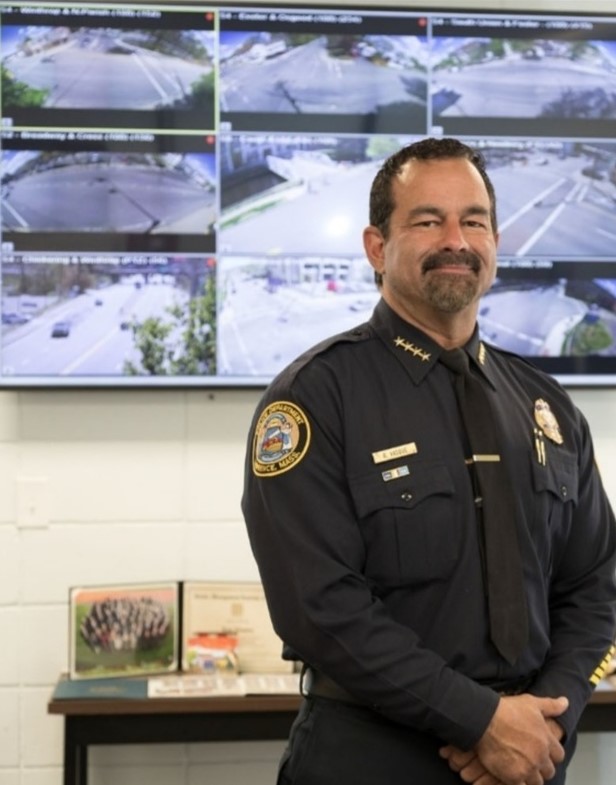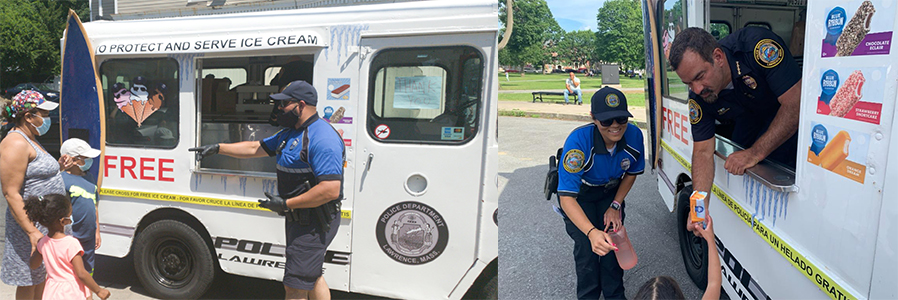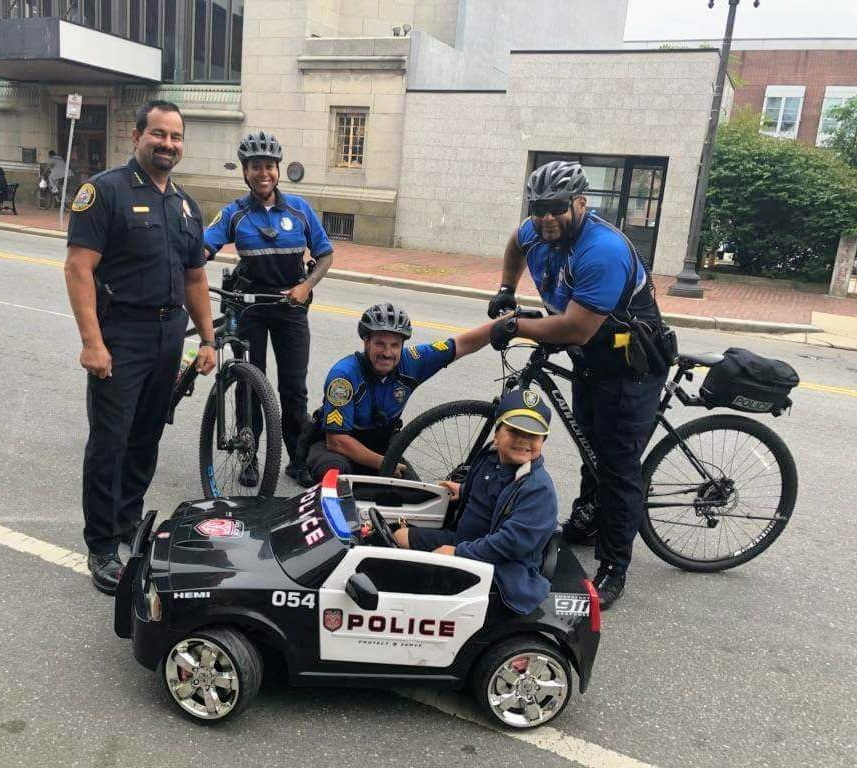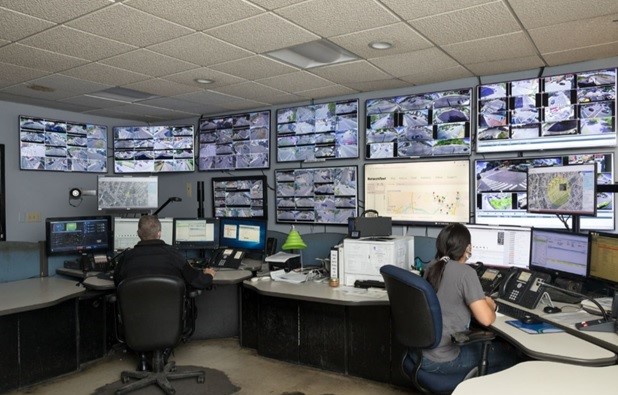Contact Us
To provide feedback on the Community Policing Dispatch, e-mail the editorial board at CPDispatch@usdoj.gov.
To obtain details on COPS Office programs, publications, and resources, contact the COPS Office Response Center at 800-421-6770 or AskCopsRC@usdoj.gov

U.S. Department of Justice
Office of Community Oriented Policing Services
Washington, DC 20530

Chief, LAWPD
An ice cream truck driven by police, giving out free cones? It might seem too good to be true, but it’s exactly what the Lawrence (Massachusetts) Police Department (LAWPD) did last summer and is doing again this year.
In warm weather, the truck, embellished with the slogan “To Protect and Serve Ice Cream,” rolls through residential neighborhoods three or four times a week, giving out cool treats donated by local businesses. It also gives out ice cream at local events when requested.
“A lot of people thought this was a strange idea,” said LAWPD Chief Roy Vasque. “Even the mayor said, ‘Why are you doing this?’ But as soon as it started, we realized it was a huge success. Not just because we got to put a lot of smiles on kids’ and parents’ faces, but because we engaged with a lot of people we wouldn’t have otherwise, and in a personal and positive way.”
“I especially wanted kids to see our police in a good light, since their interactions with us are often not during the best circumstances,” he says.
“It fosters conversations with the adults too, about a whole host of issues, not just about Lawrence and what’s going on in their community, but about what they see happening in our country. We learn a lot from these discussions.”
Ice Cream and Conversation Build Understanding
Noting that this is one of their more unusual community policing activities, Vasque adds that they do all of the traditional police activities and programs as well, including citizens’ police academy, youth camps, sports programs, and birthday cruiser drive-bys.
“We do anything and everything that gets us closer to the community,” says Vasque, noting that the department’s ethnic diversity, which mirrors the community the LAWPD serves, contributes to the feeling of solidarity.
Located about 30 miles from Boston, Lawrence has been known as “Immigrant City’’ for most of its 174 years because of the Irish, Italians, French Canadians, and others who came to work in the textile mills. Today, Lawrence is mostly Latino, with people from the Dominican Republic making up about 75 percent of the city’s population and roughly 60 percent of LAWPD’s staff.

A Majority Minority Police Force
“We are the only minority-majority police force in Massachusetts,” Vasque says, adding that about a quarter of the department’s staff is also female.
 “We made a big effort to recruit women, with a lot of social media, talks to youth groups, and a presentation at the local community college. We got onto Spanish-language radio, too.”
“We made a big effort to recruit women, with a lot of social media, talks to youth groups, and a presentation at the local community college. We got onto Spanish-language radio, too.”
“It really paid off,” he says. “We went from three female sworn officers to 20 in three to four years. And all but two are Latina.”
Another reason for the LAWPD’s strong community support is that the department has been very successful in keeping the streets safe. Vasque attributes this in large part to a city-wide camera project.
At his request, Lawrence put cameras in problem areas and major intersections throughout the city. In the three years since their installation, there has been a steady reduction in crime.
“The cameras are a force multiplier,” he says. “We can’t put a cop on every corner, but we can put a camera. As a result, we can solve crimes very quickly and take the people who commit them off the streets.”
An example he cites is a recent homicide, which the LAWPD solved. They arrested the shooter and three other accessories to the crime in just three days with help from the camera video. Another example he gives is of a driver who sped through an intersection at 100 miles per hour, hitting another car with such force that it was cut in half and its driver killed.
A Very High Clearance Rate
“With camera footage, we could identify who was driving that car and get other information that allowed us to quickly bring him to justice. Our crime clearance rates are now at or above the national average,” he says.
 Another source of pride for Chief Vasque is his department’s participation in the Active Bystandership for Law Enforcement (ABLE) Project, Georgetown University Law Center’s new training and support program for law enforcement agencies.
Another source of pride for Chief Vasque is his department’s participation in the Active Bystandership for Law Enforcement (ABLE) Project, Georgetown University Law Center’s new training and support program for law enforcement agencies.
A holistic program that teaches officers how to intervene to prevent their colleagues from causing undue harm or making costly mistakes, ABLE requires a commitment from the agency to build a culture and adopt policies that enable intervention in misconduct situations.
Training in the ABLE-certified curriculum, adherence to the program’s standards, and the endorsement of the community, demonstrated through letters of support, are required for participation. Having met all of these requirements, the LAWPD became the first police department in the Commonwealth of Massachusetts to join the program, and the first to train all of its 150 officers.
Supporting Positive Peer Intervention with ABLE
“Joining at the forefront of this program was a no-brainer for me,” says Vasque. “Though we didn’t have a lot of community complaints to begin with, and were already doing some de-escalation training, we are committed to doing everything that can prevent mistakes and reduce excessive use of force
“Our agency had been using the MILO (Multiple Interactive Learning/Training Objectives) range for scenario-based simulation training in de-escalation techniques for several years. And ABLE was an obvious next step. We know that any officer can go a little sideways sometime, not handling a situation in the best way, and want to prevent that as best we can,” he says.
“When we first announced participation in ABLE to our officers, it started the conversation about intervening. They saw what happened to George Floyd, which was a perfect example of a situation in which somebody should have stepped in. That led to their recognition of the importance of intervention in certain circumstances.”
“Our agency has always expected our officers to help their partners de-escalate an interaction before it becomes volatile, which is in line with our current Duty to Intervene Policy. ABLE taught them the best ways to step in and get results.”
“We’re proud to present this to the community as a demonstration of our commitment to serving them,” says Vasque. “It benefits the people of Lawrence, LAWPD, and our officers in many important ways.”
As with the ice cream truck, the ABLE program’s benefits rely on the quality of personal interaction. “An officer’s most effective tool is his or her mouth,” Vasque says.
“Talking to people, connecting through dialogue, getting them to understand what you are doing, and getting to understand them too, is so important.” And like the ice cream truck, he says, it’s a cool program.
Faye C. Elkins
Sr. Technical Writer
COPS Office
All photos courtesy of the Lawrence Police Department.
Subscribe to Email Updates
To sign up for monthly updates or to access your subscriber preferences, please enter your email address in the Subscribe box.






